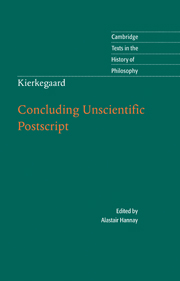Book contents
- Frontmatter
- Contents
- Introduction
- Chronology
- Further reading
- Note on the translation
- CONCLUDING UNSCIENTIFIC POSTSCRIPT TO THE PHILOSOPHICAL CRUMBS
- Preface
- Contents
- Introduction
- Part One The objective problem of Christianity's truth
- Part Two The subjective problem. The subject's relation to the truth of Christianity, or what it is to become a Christian
- 5 Conclusion
- Appendix: Understanding with the reader
- A first and last declaration by S. Kierkegaard
- Index
- Cambridge Texts in the History of Philosophy
Part One - The objective problem of Christianity's truth
Published online by Cambridge University Press: 26 February 2010
- Frontmatter
- Contents
- Introduction
- Chronology
- Further reading
- Note on the translation
- CONCLUDING UNSCIENTIFIC POSTSCRIPT TO THE PHILOSOPHICAL CRUMBS
- Preface
- Contents
- Introduction
- Part One The objective problem of Christianity's truth
- Part Two The subjective problem. The subject's relation to the truth of Christianity, or what it is to become a Christian
- 5 Conclusion
- Appendix: Understanding with the reader
- A first and last declaration by S. Kierkegaard
- Index
- Cambridge Texts in the History of Philosophy
Summary
Viewed objectively Christianity is a res in facto posita the truth of which, however, is inquired into in a purely objective way, since the modest subject is far too objective not to leave himself out or ohne weiter include himself as the one who unreservedly has faith. Thus objectively understood truth can mean: (1) the historical truth, (2) the philosophical truth. Looked at historically, the truth must be made out through a critical consideration of the various reports etc., in short, in the way that historical truth is ordinarily brought to light. In the case of philosophical truth, the inquiry turns on the relation of a historically given and ratified doctrine to the eternal truth.
Thus the investigating, speculating, knowing subject does indeed ask about the truth, but not about the subjective truth, the truth of appropriation. Thus the investigating subject is of course interested but not infinitely, personally, passionately interested in his relation to this truth in respect of his eternal happiness. Far be it from the objective subject to be so immodest, so vain.
The investigating subject must be in one of two situations; he must either be in faith and convinced of the truth of Christianity and of his own relation to it, in which case the rest cannot possibly be of infinite interest, since faith is after all precisely the infinite interest in Christianity, any other interest apt to be a temptation; or the subject is not in faith but objective in his observation, and as such here too has no infinite interest in deciding the question.
- Type
- Chapter
- Information
- Kierkegaard: Concluding Unscientific Postscript , pp. 19 - 20Publisher: Cambridge University PressPrint publication year: 2009

